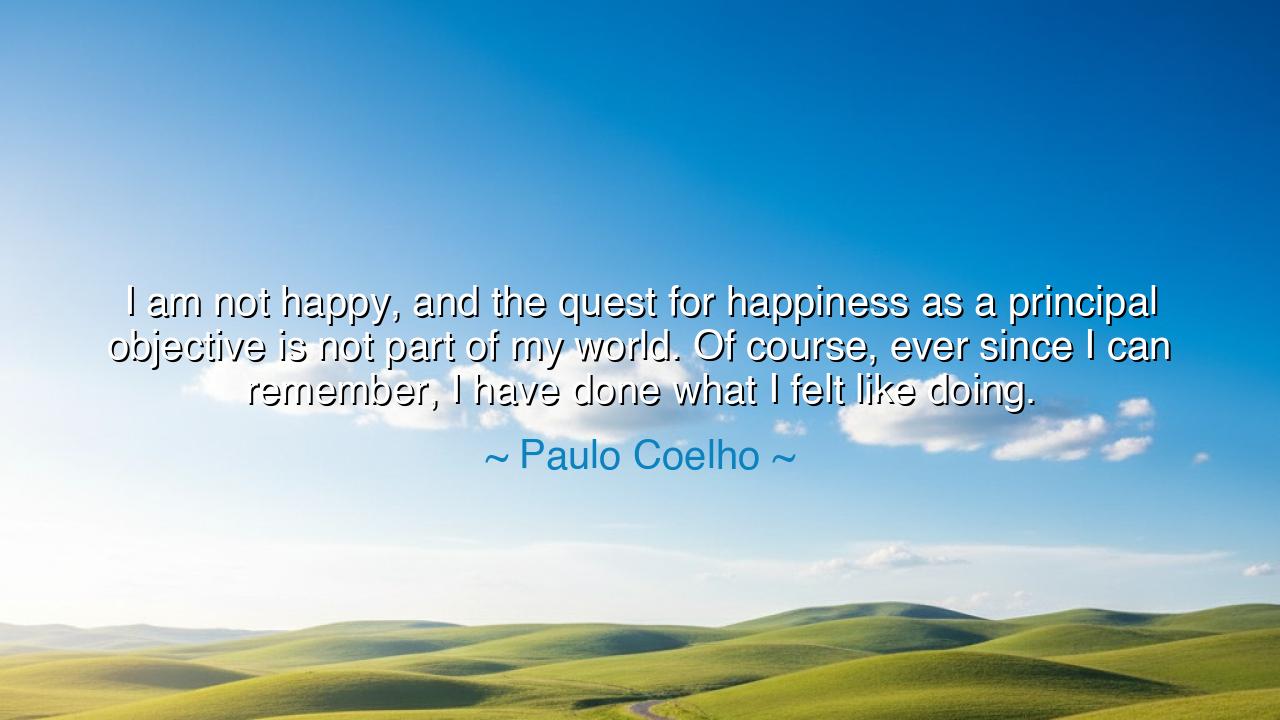
I am not happy, and the quest for happiness as a principal
I am not happy, and the quest for happiness as a principal objective is not part of my world. Of course, ever since I can remember, I have done what I felt like doing.






“I am not happy, and the quest for happiness as a principal objective is not part of my world. Of course, ever since I can remember, I have done what I felt like doing.” — thus spoke Paulo Coelho, the wanderer, the dreamer, the pilgrim of the human soul. In these words lies a paradox that only the wise can understand: that happiness, when pursued as an end, flees from the seeker; yet when one follows the quiet call of authentic desire, happiness often follows as an unbidden guest. Coelho’s confession is not one of despair, but of liberation — a declaration that the true purpose of life is not to chase happiness, but to live truthfully, guided by one’s own inner flame.
Paulo Coelho, the author of The Alchemist and many other tales of spiritual awakening, has walked a path filled with both ecstasy and suffering. He was imprisoned during his youth, misunderstood for his rebellion, and later wandered as a pilgrim along the ancient roads of Spain in search of meaning. From such a life comes this understanding: that the pursuit of happiness as an objective, as a trophy, is hollow. It is like chasing a mirage in the desert — the closer you run toward it, the farther it retreats. Yet to live in obedience to the soul’s deepest voice — that is the path of freedom.
To say “I am not happy” is not an admission of defeat, but an awakening to the truth that happiness is not constant. Even the greatest sages and heroes were not happy every day; yet their lives were filled with meaning, purpose, and beauty. Coelho, like the ancient Stoics, suggests that life’s aim should not be pleasure, but authenticity — to act according to what one truly believes, not what the world commands. In this way, he stands beside the philosophers of old who taught that the good life is not one of ease, but of integrity.
Consider the story of Siddhartha Gautama, who became the Buddha. As a prince, he lived in perfect comfort and abundance, surrounded by music, gold, and laughter. Yet in that luxury he found no peace. When he left the palace to follow the call of his heart, he entered the wilderness — hungry, cold, alone — yet for the first time, he was free. He did not seek happiness, but truth, and in that truth he found the stillness of enlightenment. So too does Coelho remind us that joy is not in the endless pursuit of delight, but in the alignment of the soul with its purpose.
To “do what I feel like doing,” as Coelho says, is not the careless indulgence of whim, but the courage to listen to the voice within, the one that whispers the direction of destiny. Most people, fearing failure or judgment, live by the expectations of others — they serve comfort, reputation, or wealth. But those who follow their inner calling, even through hardship, discover a joy deeper than happiness: the joy of living one’s truth. This is the joy of the artist who creates from the heart, of the pilgrim who walks without knowing the destination, of the lover who dares to feel deeply, even when love wounds.
In Coelho’s words, we also hear the echo of the ancients: the Stoic Marcus Aurelius wrote that a man’s peace lies not in chasing pleasure, but in living according to his nature. The Taoists taught that when one acts in harmony with the Tao — the Way — one moves effortlessly, like water flowing through stone. So too does Coelho live by that current: he does not strive for happiness, yet he moves in the direction of his own truth, and happiness touches him in passing like sunlight through clouds.
Therefore, take this teaching to heart, you who seek meaning: do not make happiness your god, for it is a fickle deity. Instead, worship the flame of authentic living. Ask not, “Will this make me happy?” but “Is this true to my spirit?” The former leads to exhaustion; the latter, to peace. Walk your path bravely, even when the way is dark. The storms will pass, and in their wake you will find not the shallow comfort of pleasure, but the enduring serenity of self-truth.
For in the end, as Paulo Coelho teaches, life is not about being happy, but about being alive — fully, courageously, beautifully alive. Happiness comes and goes like the wind, but the one who has followed their own heart stands unshaken, knowing that they have lived as they were meant to live. And that, though Coelho names it not, is the truest happiness of all.






AAdministratorAdministrator
Welcome, honored guests. Please leave a comment, we will respond soon